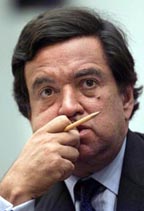|
August 21, 2000 Features What's
in Your Green Tea? Why
I'm Voting for Nader ... ...
And Why I'm Not Fox
Shocks the World Tijuana
Troubles Unions
Get Religion News Safety
Last Sale
of the Century Water
Wars Profile Editorial Viewpoint Appall-O-Meter Give
It Away Good
Fela Time's
Arrow Mission:
Impossible 3 |
Safety Last
By Dave Lindorff
This summer's high oil prices are hurting more than consumers' pocketbooks. Union officials and insurance companies say they're harming workers too, as oil producers-drilling, pipeline and refinery companies alike-push production to the max to sell as much of the high-priced black gold as possible before prices drop.
The problem is twofold: Oil companies have hired poorly trained employees to beef up shrunken workforces and re-opened wells that were too inefficient
 |
| Energy Secretary Bill Richardson advised oil companies to boost production at the expense of worker safety. Credit: Stephen Jaffe/AFP. |
to operate a year ago when oil prices were less than $20 a barrel. According to John Beckett, senior vice president of Zurich Global Energy, a casualty insurer for oil field operations, 330 more oil rigs are operating in the United States this year. That's an increase of nearly 30 percent at a time when the oil production workforce has significantly decreased.
Beckett says there is a direct relationship between increased oil production and a 10 percent jump this year in death-benefit payments and workers' compensation claims for on-the-job injuries. "You get rigs erected with problems like railings missing," Beckett explains. "You also get short-staffing because most of these companies have already let a lot of trained people go, so they'll start operating a rig with seven people instead of eight. And you get unseasoned workers hired who aren't as skilled-and they make mistakes."
As oil prices slumped during the mid-'90s, oil companies laid off large numbers of workers, many of whom have long since either retired or moved on to other jobs and locales. A wave of mergers among the major companies also led to widespread layoffs of skilled, unionized workers. Now the major companies are increasingly subcontracting out to smaller independent firms, which are typically nonunion.
The government has made the situation even worse. Not long ago, the oil industry was actually encouraged by the Clinton administration to ramp up production, even at the risk of downplaying safety concerns. As heating oil prices rose late last winter, Energy Secretary Bill Richardson called on oil companies to delay scheduled maintenance work on production facilities to quickly boost supplies. The move was immediately condemned by Robert E. Wages, executive vice president of the Paper, Allied-Industrial, Chemical and Energy Workers Union (PACE), who warned that delaying maintenance schedules "poses an imminent danger to all involved."
In a letter to Richardson, Wages noted that two serious refinery accidents in recent years-an incident at a Unocal facility in Lemont, Illinois and another at a Shell refinery in Norco, Louisiana-were traced to those companies' failure to perform scheduled maintenance. And a 1999 accident at a Tosco refinery in Martinez, California occurred because the company had workers perform maintenance on high-temperature and pressure units while they were in operation, in order to minimize any disruption in production. Four workers died and one was seriously injured. "Delayed maintenance is not something the government needs to be supporting," Wages wrote. "The price in death, destruction, pollution and lost production when one of these refineries explodes because maintenance wasn't done more than cancels out any possible marginal benefit to the consumer."
Beckett insists that most corporate risk managers, who generally work out of company finance offices, are anxious to take steps to ensure safety on the job. After all, a few deaths or major compensation claims at a company doing $100 million a year in revenues can raise insurance premiums by as much as $1 million a year. But at $38 a barrel, there is also the temptation to make money fast while the price is right. "With all that money there for the taking, the fear of problems goes away," Beckett says. "Companies just want to get their wells up and running."
The Department of Energy's quick-fix solution for boosting oil supplies at workers' expense should come as little surprise. The oil industry has been a significant campaign contributor to Democratic candidates, especially Clinton and Gore. Occidental Petroleum, which loaned the Democratic National Committee $100,000 back in 1992 for the Clinton/Gore inaugural celebration, also ponied up a $50,000 contribution to the Democratic Party after one of Gore's now infamous phone solicitations from the White House.
Gore himself is a trustee for Occidental stock worth some $500,000. (The Gore family received the stock while the vice president's father, Albert Gore Sr., was working as a $500,000-a-year executive for the company.) As of July 1, Gore had received $100,000 in donations from oil industry sources. And while that sum is dwarfed by the $1.5 million in donations received by George W. Bush, the oil industry also donated $1.4 million to the Democratic Party's soft-money campaign fund, most of which ends up being used to support the party's presidential candidate.
A total of 66 oil and gas companies have contributed to the Gore campaign.
The Democratic Party has received contributions from 28 oil and gas companies,
topped by $268,000 from BP Amoco, $197,750 from Enron, $180,500 from Chevron
and $55,000 from Exxon Mobil. (Both BP Amoco and Exxon Mobil completed
controversial megamergers during the Clinton/Gore administration's second
term). All of this money may explain why Gore has been strong on condemnation
of oil and gas companies, but short on hard-hitting solutions to high
gas prices-and why the administration has done so little to protect workers
from the growing safety threats posed by increased oil production. ![]()
|
In These Times ©
2000
Vol. 24, No. 19 |
